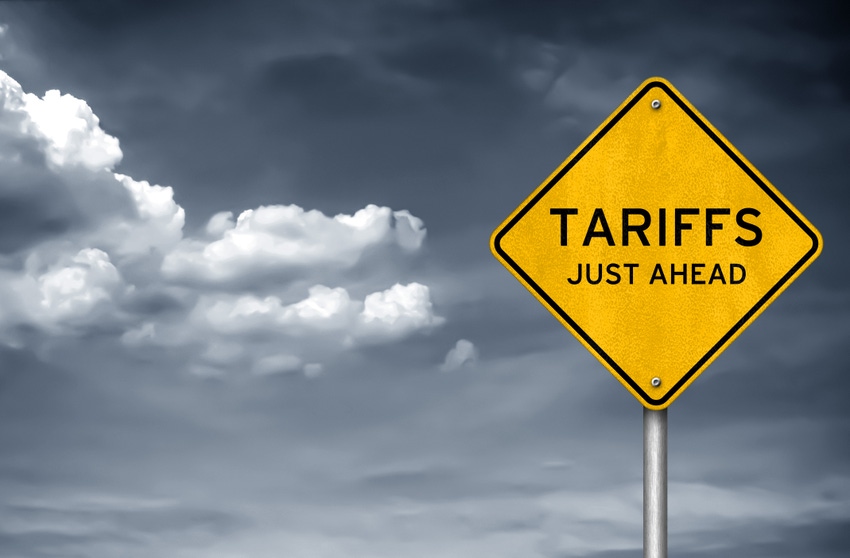Administration urged to "double down" on efforts to remove $4 billion in tariffs related to WTO Boeing dispute.

America’s leading agricultural commodity groups and trade associations sent a letter to U.S. Trade Representative Robert Lighthizer asking that he and the Trump Administration work to “deepen trade discussions” in order to bring about World Trade Organization compliance and removal of the European Union's retaliatory tariffs targeting U.S. food and agricultural exports.
The letter was led by the Distilled Spirits Council of the United States and Farmers for Free Trade.
The EU first levied a 25% tariff on U.S. exports such as American whiskey, sweet corn, orange juice and rice in June 2018 in response to U.S. tariffs on steel and aluminum. The tariff on certain products will increase to 50% in June 2021. In October 2019, the U.S. imposed tariffs on certain EU food and agricultural exports like butter, cheese, olive oil, pork, clams, distilled spirits and wine in connection to the WTO Airbus ruling.
On Oct. 26, 2020, the WTO Dispute Settlement Body authorized the EU to impose tariffs on U.S. imports valued at $4 billion in connection with the WTO Boeing dispute. On Nov. 10, 2020, the EU imposed tariffs on a wide range of American food and agricultural exports, including certain cheeses, agricultural equipment, distilled spirits, potatoes, nuts, fruits, juices, chocolate and ketchup.
“The escalation of tariffs on the EU and U.S. spirits industry is compounding the severe economic crisis distilleries, restaurants and bars are facing as a result of COVID-19,” Robert Maron, vice president for international trade for the Distilled Spirits Council of the United States, said, noting that American whiskey exports to the EU have tumbled 41% since the EU’s 25% retaliatory tariff went into effect in June 2018, and new EU tariffs on U.S. rum, vodka and brandy were just imposed last week. “We need the U.S. and EU to get back to the negotiating table to immediately eliminate these tariffs to help protect hospitality jobs on both sides of the Atlantic.”
“Farmers are battling to stay above water, and any new tariff in this time of crisis is a big concern,” said Brian Kuehl, co-executive director of Farmers for Free Trade. “We know these tariffs are part of a long legal battle, but anytime farmers become collateral damage, it is unacceptable. American farmers need stability, and that means predictable exports into markets like the EU. We are urging this Administration and the next one to double down on their effort to resolve this dispute in a manner that frees our farmers from harmful tariffs.”
“Given existing disruptions to trade, the impact of COVID and weather-related events that have hit farmers this year, American food and agriculture needs stability, predictability and the ability to grow exports,” the letter stated. "For these reasons, we strongly urge the U.S. and EU to deepen trade discussions in order to bring about WTO compliance and, therefore, allow for the removal of tariffs to help unlock the opportunity for our producers to successfully access the European market. Concomitant with that goal, we also urge the uprooting of unfounded EU non-tariff barriers that impede the American food and agriculture sector’s ability to fully realize the potential opportunities in the EU.”
Other industry groups to sign the letter include the American Farm Bureau Federation, American Seed Trade Assn., American Soybean Assn., Associate of Equipment Manufacturers, Corn Refiners Assn., International Dairy Foods Assn. (IDFA), National Corn Growers Assn., National Council of Farmer Cooperatives, National Milk Producers Federation, North American Meat Institute, U.S. Dairy Export Council, U.S. Grains Council and USA Rice.
In a notice to IDFA members earlier in the week, IDFA president and chief executive officer Dr. Michael Dykes said the group urged the current and future U.S. administrations to pursue a trading relationship with the EU that is “based on fair competition and a level playing field.” Dykes noted that U.S. dairy producers and exporters have suffered for years under the weight of the EU’s market-distorting practices, while dairy importers also suffer under these heightened trade tensions.
“While the value of the dairy products identified in the list is not significant, IDFA views any barrier to U.S. dairy exports as harmful, particularly given the trade imbalance that exists in dairy with the EU,” Dykes said. The value of U.S. dairy exports to the EU was just over $145 million in 2018 and fell to $116 million in 2019.
About the Author(s)
You May Also Like





